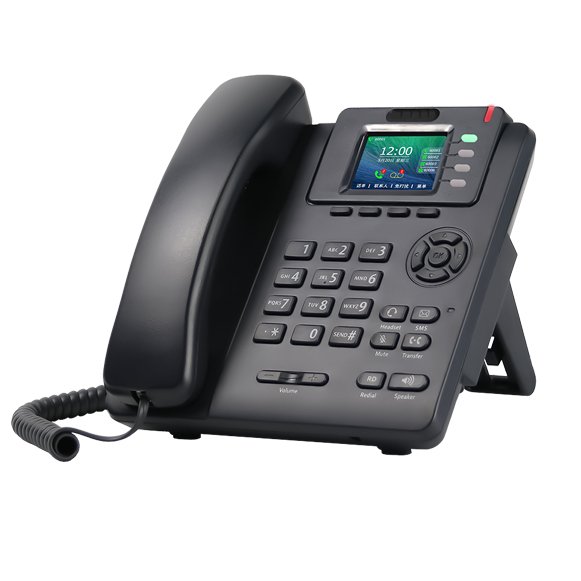
In the corporate world, almost every technology is accompanied by a plethora of acronyms. Take telephony, for example, not many know exactly what PSTN, PRI, ISDN, VoIP, SIP, etc. mean. Of course, you may have a gram of vague ideas that it is used somewhere in the office.
So it’s no surprise that one of the most common questions is – what’s the difference between VoIP and SIP? For industry experts, the differences are pretty obvious. It seems that vendors can use them interchangeably, but they also refer to different things.
VoIP vs. SIP
When people ask about the difference between VoIP and SIP, they usually want to know which one to use. What are the benefits to their company? Unfortunately, comparing VoIP and SIP is not valid. That’s because they refer to completely different things.
What is VoIP?
VoIP stands for Voice over Internet Protocol. In short, it refers to any technology that allows voice signals to travel over the Internet. It can also be called broadband telephony, Internet telephony and many other names. It doesn’t matter what technology or hardware and software you use. Remember, if a voice call travels over the Internet, it can be referred to as VoIP.
What is SIP?
- SIP stands for Session Initiation Protocol. The protocol is a system of digital rules that allows devices to communicate with each other. Think of it as the language of computer hardware. If your computer and modem do not use the same language, they will not be able to communicate.
- SIP is just one of the many protocols that can be used to implement VoIP. It is used to set up and terminate multimedia sessions, including voice and video. Currently, it is the most widely used protocol and is the industry standard. Perhaps the industry standard when users are trying to figure out what VoIP is using is SIP using VoIP, and that is why many people are confused between the two.
The relationship between VoIP and SIP
Now that you know exactly what VoIP is and exactly what SIP is, it’s time to understand the relationship between them. It is similar to the relationship between a website and HTML. A Web site is a collection of pages that can be accessed through a Web browser, and HTML is a language that can be used to build a Web site. However, most websites also use other languages
Similarly, VoIP refers to any method of sending voice calls over the Internet. This means that everything from Hopeiker to business phone service falls under the same umbrella. SIP is just one of the many protocols currently in use. Therefore, you can also implement VoIP using other protocols.
SIP and VoIP are not the most effective issues
While all SIP is used to support and extend VoIP, not all VoIP supports SIP technology. SIP is simply a protocol that can be used in business VoIP to extend the scope of communication beyond pure voice calls to support video conferencing, instant messaging, text, and other multimedia communications. It is indeed the most popular protocol, although certain vendors interpret SIP in different ways. however, this is changing as interoperability is critical to long-term business success.
Advantages and disadvantages of VoIP
VoIP is a broad term that can be used to describe any Internet telephony service, from low-cost residential services to complex implementations of enterprise unified communications tools. Since the quality and features of VoIP can vary widely, the advantages and disadvantages of each may also depend on the type of service.
However, it is not useful to evaluate the pros and cons of VoIP compared to SIP. To best understand how VoIP stacks up against VoIP using SIP, the wisest approach is to evaluate the pros and cons of a commercial Internet telephony service that includes only voice communications (VoIP only) and no multimedia features (VoIP with SIP).
VoIP Benefits
– Low initial investment cost.
– Ongoing cost savings through predictable flat-rate monthly billing
– VoIP systems are highly portable and do not require on-site installation.
– Many basic VoIP service plans offer limited features, such as caller ID, call waiting, and call forwarding.
– Most VoIP providers do not require long-term service contracts.
VoIP Disadvantages
– Bandwidth is required to provide service availability and adequate call quality of service (QoS).
– Some basic VoIP services may not offer mobile integration or mobile applications.
– Voice-only services lack support for multimedia communications.
– Cannot be integrated with applications such as Salesforce, DropBox or Microsoft Office.
Pros and cons of using SIP for VoIP communication
Switching from traditional PRI to SIP can enable organizations to make immediate cost savings and expand to unlock new features and productivity tools. To effectively compare SIP to VoIP, it is best to examine how SIP can enhance VoIP into a multimedia communications experience compared to a voice-only Internet telephony service.
VoIP with SIP Benefits
– By allowing companies to integrate technology into unified communications, there are immediate cost savings for business applications.
– If the data connection is disconnected, the failure is transferred to the employee mobile device.
– Great pricing flexibility can be provided by allowing companies to purchase additional features and product lines as needed.
– Includes user-friendly management tools for adding lines and features.
– Seamless integration with cloud applications for unified communications is possible.
– Can provide built-in integration with common business applications and software to improve productivity
– Can be integrated with existing PRI lines to create hybrid phone systems
VoIP with SIP Benefits
– SIP requires sufficient Internet bandwidth to support quality service.
– The quality of service provided by SIP providers may vary.
– SIP vendors offer varying functionality and may not include a complete UC product.
– Contrary to dedicated fiber Internet services from the same provider as your SIP carrier, SIP over public Internet services can pose quality and security risks.
How to know which one is best for you
If you are asking whether SIP or VoIP is the better technology, then you may have committed to consider switching to an Internet-based phone system. However, SIP vs. VoIP is not a direct comparison. The most useful question to ask is whether a voice-only VoIP phone service would best meet your business needs, or whether a SIP implementation using a unified communications tool would be more appropriate.
For many organizations, VoIP vs. UCaaS is a better comparison than VoIP vs. SIP. Factors that may influence your understanding of the appropriateness of UCaaS include your budget and desire to adopt multimedia communications tools. If your organization is already using collaboration applications or technologies as part of unified communications, then you have a strong SIP use case.
SIP enhances basic VoIP functionality by allowing companies to exchange messages, video, files, and other forms of data over an Internet connection, not just voice calls. For many companies, moving directly to SIP and unified communications can save money and increase productivity.


